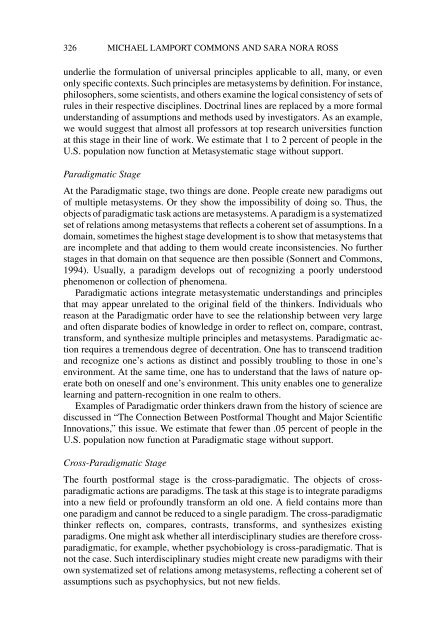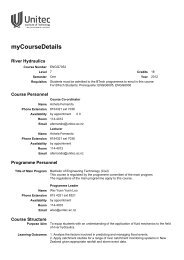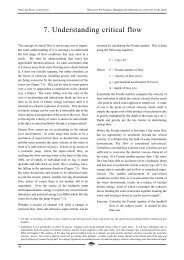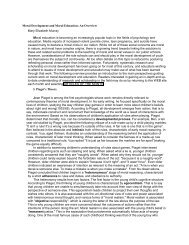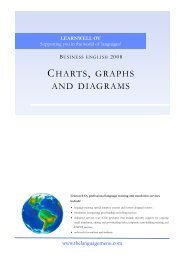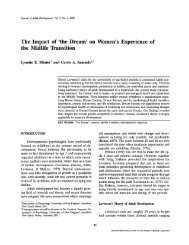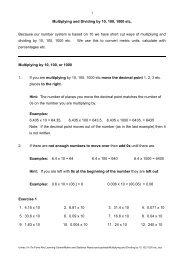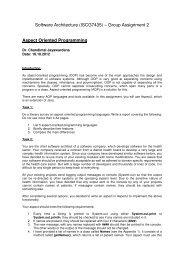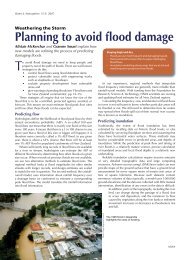WHAT POSTFORMAL THOUGHT IS, AND WHY IT MATTERS
WHAT POSTFORMAL THOUGHT IS, AND WHY IT MATTERS
WHAT POSTFORMAL THOUGHT IS, AND WHY IT MATTERS
Create successful ePaper yourself
Turn your PDF publications into a flip-book with our unique Google optimized e-Paper software.
326 MICHAEL LAMPORT COMMONS <strong>AND</strong> SARA NORA ROSS<br />
underlie the formulation of universal principles applicable to all, many, or even<br />
only specific contexts. Such principles are metasystems by definition. For instance,<br />
philosophers, some scientists, and others examine the logical consistency of sets of<br />
rules in their respective disciplines. Doctrinal lines are replaced by a more formal<br />
understanding of assumptions and methods used by investigators. As an example,<br />
we would suggest that almost all professors at top research universities function<br />
at this stage in their line of work. We estimate that 1 to 2 percent of people in the<br />
U.S. population now function at Metasystematic stage without support.<br />
Paradigmatic Stage<br />
At the Paradigmatic stage, two things are done. People create new paradigms out<br />
of multiple metasystems. Or they show the impossibility of doing so. Thus, the<br />
objects of paradigmatic task actions are metasystems. A paradigm is a systematized<br />
set of relations among metasystems that reflects a coherent set of assumptions. In a<br />
domain, sometimes the highest stage development is to show that metasystems that<br />
are incomplete and that adding to them would create inconsistencies. No further<br />
stages in that domain on that sequence are then possible (Sonnert and Commons,<br />
1994). Usually, a paradigm develops out of recognizing a poorly understood<br />
phenomenon or collection of phenomena.<br />
Paradigmatic actions integrate metasystematic understandings and principles<br />
that may appear unrelated to the original field of the thinkers. Individuals who<br />
reason at the Paradigmatic order have to see the relationship between very large<br />
and often disparate bodies of knowledge in order to reflect on, compare, contrast,<br />
transform, and synthesize multiple principles and metasystems. Paradigmatic action<br />
requires a tremendous degree of decentration. One has to transcend tradition<br />
and recognize one’s actions as distinct and possibly troubling to those in one’s<br />
environment. At the same time, one has to understand that the laws of nature operate<br />
both on oneself and one’s environment. This unity enables one to generalize<br />
learning and pattern-recognition in one realm to others.<br />
Examples of Paradigmatic order thinkers drawn from the history of science are<br />
discussed in “The Connection Between Postformal Thought and Major Scientific<br />
Innovations,” this issue. We estimate that fewer than .05 percent of people in the<br />
U.S. population now function at Paradigmatic stage without support.<br />
Cross-Paradigmatic Stage<br />
The fourth postformal stage is the cross-paradigmatic. The objects of crossparadigmatic<br />
actions are paradigms. The task at this stage is to integrate paradigms<br />
into a new field or profoundly transform an old one. A field contains more than<br />
one paradigm and cannot be reduced to a single paradigm. The cross-paradigmatic<br />
thinker reflects on, compares, contrasts, transforms, and synthesizes existing<br />
paradigms. One might ask whether all interdisciplinary studies are therefore crossparadigmatic,<br />
for example, whether psychobiology is cross-paradigmatic. That is<br />
not the case. Such interdisciplinary studies might create new paradigms with their<br />
own systematized set of relations among metasystems, reflecting a coherent set of<br />
assumptions such as psychophysics, but not new fields.


